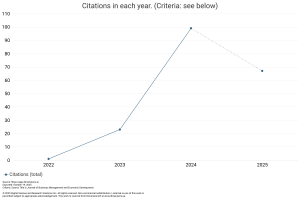From Art to Social Entrepreneurship Praxis: The Collaboration Dynamics of Warung Murakabi Minggir through Interpretative Phenomenological Analysis
DOI:
https://doi.org/10.59653/jbmed.v1i02.148Keywords:
Collaboration Dynamics, Social Entrepreneurship, Mutual Cooperation, Art, Locality, Interpretative Phenomenological Analysis, IPAAbstract
In this article, we delve into the collaboration dynamics of Warung Murakabi Minggir, a social entrepreneurship praxis of collaboration that uniquely merges art, locality, and mutual cooperation to tackle social issues. The purpose of this research is to understand how the participants make sense of their collaborative experiences in Warung Murakabi Minggir. Our study employs Interpretative Phenomenological Analysis (IPA) to delve into the lived experiences and viewpoints of the individuals engaged in the collaboration. This article sheds light on the critical role of collaboration within diversity in establishing sustainable social entrepreneurship practices. The findings of our study emphasize a deep comprehension of how collaborative experiences in Warung Murakabi Minggir serve as catalysts for generating positive social impact. Moreover, the research emphasizes the pivotal role of collaboration, how the dynamics of collaboration can either facilitate or impede progress of Murakabi Minggir as social entrepreneurship praxis
Downloads
References
Alase, A. (2017). The Interpretative Phenomenological Analysis (IPA): A Guide to a Good Qualitative Research Approach. International Journal of Education and Literacy Studies, 5(2), 9. https://doi.org/10.7575/aiac.ijels.v.5n.2p.9
Alzahrani, F. (2021). The Role of Social Entrepreneurship in the Process of Recovery from Disaster: A Systematic Literature Review During Covid-19 Era. International Journal of Economics, Business and Management Research, 5(10), 2021. www.ijebmr.com
Arshed, N., & Danson, M. (2016). Enterprise: Concepts and issues. Goodfellow Publishers Ltd.
Bansal, S., Garg, I., & Sharma, G. D. (2019). Social entrepreneurship as a path for social change and driver of sustainable development: A systematic review and research agenda. Sustainability (Switzerland), 11(4). https://doi.org/10.3390/su11041091
Bungin, B. (2007). Penelitian kualitatif: komunikasi, ekonomi, kebijakan publik, dan ilmu sosial lainnya (Vol. 2). Kencana.
Bungin, B. (2011). Penelitian Kualitatif. Jakarta: Kencana Predana Media. Group.
Cardella, G. M., Hernández-Sánchez, B. R., Monteiro, A. A., & Sánchez-García, J. C. (2021). Social entrepreneurship research: Intellectual structures and future perspectives. Sustainability (Switzerland), 13(14). https://doi.org/10.3390/su13147532
Chatterjee, I., Cornelissen, J., & Wincent, J. (2021). Social entrepreneurship and values work: The role of practices in shaping values and negotiating change. Journal of Business Venturing, 36(1). https://doi.org/10.1016/j.jbusvent.2020.106064
Chell, E., & Baines, S. (2000). Networking, entrepreneurship and microbusiness behaviour. Entrepreneurship and Regional Development, 12(3), 195–215. https://doi.org/10.1080/089856200413464
Cope, J. (2011). Entrepreneurial learning from failure: An interpretative phenomenological analysis. Journal of Business Venturing, 26(6), 604–623. https://doi.org/10.1016/j.jbusvent.2010.06.002
Cresswell, J. (2009). Research design: Qualitative, Quantitative and Mixed methods approaches SAGE publication.
de Bruin, A., Shaw, E., & Lewis, K. V. (2017). The collaborative dynamic in social entrepreneurship. Entrepreneurship and Regional Development, 29(7–8), 575–585. https://doi.org/10.1080/08985626.2017.1328902
Durmuş, M. E., & Ergen, Y. (2021). The experiences of classroom teachers on the homework process in teaching mathematics: An interpretative phenomenological analysis. Journal of Pedagogical Research, 5(1), 293–314. https://doi.org/10.33902/jpr.2021167935
Durkin, C., & Gunn, R. (Eds.). (2016). Social entrepreneurship: A skills approach. Policy Press.
Elisabeth Sundin. (2016). Journal of Enterprising Communities : People and Places in the Global Economy Article information : Journal of Enterprising Communities, 10(4), 29.
Elsafty, A., Abadir, D., & Shaarawy, A. (2020). How Does the Entrepreneurs’ Financial, Human, Social and Psychological Capitals Impact Entrepreneur’S Success? Business and Management Studies, 6(3), 55. https://doi.org/10.11114/bms.v6i3.4980
Galkina, T., & Jack, S. (2022). The synergy of causation and effectuation in the process of entrepreneurial networking: Implications for opportunity development. International Small Business Journal: Researching Entrepreneurship, 40(5), 564–591. https://doi.org/10.1177/02662426211045290
Ghalwash, S., Tolba, A., & Ismail, A. (2017). What motivates social entrepreneurs to start social ventures?: An exploratory study in the context of a developing economy. Social Enterprise Journal, 13(3), 268–298.
Irwansyah, N. N. H., & Hidayah, S. (2022). Analisis Strategi Pengembangan Kewirausahaan Berbasis Komunitas Lokal Generasi Milenial Di Kota Banjarmasin. In Prosiding Seminar Nasional Lingkungan Lahan Basah (Vol. 7, No. 2).
Karami, M., & Read, S. (2021). Co-creative entrepreneurship. 36(February), 1–16.
Kosmynin, M. (2021). Social entrepreneurship organisations and collaboration: taking stock and looking forward. International Journal of Entrepreneurial Behaviour & Research, 28(2), 441–470. https://doi.org/10.1108/ijebr-02-2021-0144
Kovanen, S. (2021). Social entrepreneurship as a collaborative practice: literature review and research agenda. Journal of Entrepreneurship, Management and Innovation, 17(1), 97–128. https://doi.org/10.7341/20211713
Kwong, C., Tasavori, M., & Wun-mei Cheung, C. (2017). Bricolage, collaboration and mission drift in social enterprises. Entrepreneurship and Regional Development, 29(7–8), 609–638. https://doi.org/10.1080/08985626.2017.1328904
Lin, H., Li, Y., & Zhou, L. (2022). A Consociation Model: Organization of Collective Entrepreneurship for Village Revitalization. Systems, 10(4), 1–18. https://doi.org/10.3390/systems10040127
Lukiyanto, K., & Wijayaningtyas, M. (2020). Gotong Royong as social capital to overcome micro and small enterprises’ capital difficulties. Heliyon, 6(9). https://doi.org/10.1016/j.heliyon.2020.e04879
Mair, Johanna. (2020). Social Entrepreneurship: Research as Disciplined Exploration. SSRN Electronic Journal. https://doi.org/10.2139/ssrn.3568955
McKeever, E., Anderson, A., & Jack, S. (2014). Entrepreneurship and mutuality: social capital in processes and practices. Entrepreneurship and Regional Development, 26(5–6), 453–477. https://doi.org/10.1080/08985626.2014.939536
Mignenan, V. (2021). Collective Intelligence and Entrepreneurial Resilience in the Context of Covid-19. International Business Research, 14(9), 1. https://doi.org/10.5539/ibr.v14n9p1
Mihas, P. (2019). Qualitative data analysis. Oxford Research Encyclopedia of Education. https://doi.org/10.1093/acrefore/9780190264093.013.1195
Barsoum, M. (2022). The Importance of Qualitative and Phenomenological Research Methods in Business Studies. Monarch Business School Research Paper Series, 1(1), 1–16.
Muzahidul, M., Patowary, I., Javaid, T., Thi, L., Quynh, B., & Thiru, P. (2020). The Impact of The Entrepreneur’s Socialnetworks on The Performance of The Firm During The Early Stages of Internationalization. https://ssrn.com/abstract=3643607 25
Neubauer, B. E., Witkop, C. T., & Varpio, L. (2019). How phenomenology can help us learn from the experiences of others. Perspectives on Medical Education, 8(2), 90–97. https://doi.org/10.1007/s40037-019-0509-2
Olinsson, S. B. (2017). Social Entrepreneurship-Committing Theory to Practice. Journal of Social Entrepreneurship, 8(2), 225–247. https://doi.org/10.1080/19420676.2017.1375547
Olmedo, L., & O’Shaughnessy, M. (2022). Community‐Based Social Enterprises as Actors for Neo‐Endogenous Rural Development: A Multi‐Stakeholder Approach ☆. Rural Sociology, 87(4), 1191–1218. https://doi.org/10.1111/ruso.12462
Pietkiewicz, I., Smith, J. A., Pietkiewicz, I., & Smith, J. A. (2014). A practical guide to using Interpretative Phenomenological Analysis in qualitative research psychology. Czasopismo Psychologiczne Psychological Journal, 20(1), 7–14. https://doi.org/10.14691/cppj.20.1.7
Prasetyo, P. E., Setyadharma, A., & Kistanti, N. R. (2021). The Collaboration of Social Entrepreneurship and Institution for Sustainable Regional Development Security. Open Journal of Business and Management, 09(05), 2566–2590. https://doi.org/10.4236/ojbm.2021.95141
Prastowo, A. (2011). Metode penelitian kualitatif dalam perspektif rancangan penelitian. Jogjakarta: Ar-ruzz media, 43.
Pret, T., & Carter, S. (2017). The importance of ‘fitting in’: collaboration and social value creation in response to community norms and expectations. Entrepreneurship and Regional Development, 29(7–8), 639–667. https://doi.org/10.1080/08985626.2017.1328903
Pyrko, I., Dörfler, V., & Eden, C. (2017). Thinking together: What makes Communities of Practice work? Human Relations, 70(4), 389–409. https://doi.org/10.1177/0018726716661040
Ratten, V. (2022). Coronavirus (covid-19) and social value co-creation. International Journal of Sociology and Social Policy, 42(3–4), 222–231. https://doi.org/10.1108/IJSSP-06-2020-0237
Ravn, S. (2023). Integrating qualitative research methodologies and phenomenology—using dancers’ and athletes’ experiences for phenomenological analysis. Phenomenology and the Cognitive Sciences, 22(1), 107–127. https://doi.org/10.1007/s11097-021-09735-0
Rose, J., & Johnson, C. W. (2020). Contextualizing reliability and validity in qualitative research: toward more rigorous and trustworthy qualitative social science in leisure research. Journal of Leisure Research, 51(4), 432–451. https://doi.org/10.1080/00222216.2020.1722042
Ruggiano, N., & Perry, T. E. (2019). Conducting secondary analysis of qualitative data: Should we, can we, and how? Qualitative Social Work, 18(1), 81–97. https://doi.org/10.1177/1473325017700701
Shomoye-Olusi, A. M., Orekoya, I. O., Adepeju-Orekoya, Q. A., & Akintimehin, O. O. (2022). The role of social entrepreneurship in community recovery and development in the Post-COVID-19 pandemic period. In Springer eBooks (pp. 293–319). https://doi.org/10.1007/978-3-031-04252-2_16
Simarmata, N., Yuniarti, K., Riyono, B., & Patria, B. (2019). The Decadence of Gotong Royong. 370, 74–79. https://doi.org/10.2991/adics-elssh-19.2019.16
Simarmata, N., Yuniarti, K. W., Riyono, B., & Patria, B. (2020). Gotong Royong in Indonesian History. Digital Press Social Sciences and Humanities, 5(2), 00006. https://doi.org/10.29037/digitalpress.45341
Slikkerveer, L. J. (2019). Gotong Royong: An Indigenous Institution of Communality and Mutual Assistance in Indonesia. 307–320. https://doi.org/10.1007/978-3-030-05423-6_14
Smith, J. A., & Osborn, M. (2008). Interpretative Phenomenological analysis. In The British Psychological Society and Blackwell Publishing Ltd eBooks (pp. 229–254). https://doi.org/10.1002/9780470776278.ch10
Smith, J. A. (2014). A practical guide to using Interpretative Phenomenological Analysis in qualitative research psychology. Czasopismo Psychologiczne Psychological Journal, 20(1), 361–369. https://doi.org/10.14691/cppj.20.1.7
Sophie, M. (2023). Creating Copreneurial Identities . A phenomenological study of how copreneurs make sense of their lived experience of work and family life in copreneurial business Creating Copreneurial Identities Sophie Maria MUSCATELLI.
Suddick, K. M., Cross, V., Vuoskoski, P., Galvin, K. T., & Stew, G. (2020). The Work of Hermeneutic Phenomenology. International Journal of Qualitative Methods, 19, 1–14. https://doi.org/10.1177/1609406920947600
Sugiyono, M. P. P. K., & Kuantitatif, P. (2008). Kualitatif dan R & D, cet. Bandung Alf.
Suharti, L., & Sasongko, G. (2019). http://jssidoi.org/esc/home. 7(1), 233–246.
Taylor, M. (2013). Partial differential equations II: Qualitative studies of linear equations (Vol. 116). Springer Science & Business Media.
Teng-Calleja, M., Cuyegkeng, M. A. C., Caringal-Go, J. F., Baquiano, M. J., Tan, A. M. A., & Cementina-Olpoc, R. (2023). Community Engagement Experiences of Social Entrepreneurs in Rural Communities. International Perspectives in Psychology. https://doi.org/10.1027/2157-3891/a000071
Ţigu, G., Iorgulescu, M. C., Răvar, A. S., & Lile, R. (2015). A pilot profile of the social entrepreneur in the constantly changing Romanian economy. Amfiteatru Economic, 17(38), 25–43.
Tomaszewski, L. E., Zarestky, J., & Gonzalez, E. (2020). Planning Qualitative Research: Design and Decision Making for New Researchers. International Journal of Qualitative Methods, 19, 1–7. https://doi.org/10.1177/1609406920967174
Utomo, H., Priyanto, S., Suharti, L., & Sasongko, G. (2019). Developing Social Entrepreneurship: A Study Of Community Perception In Indonesia. 7(1), 233–246. http://doi.org/10.9770/jesi.2019.7.1(18)
White, M. (2019). Commentary: An interpretative phenomenological analysis of young men’s experiences of addressing their sexual health and the importance of researcher reflexivity. Journal of Research in Nursing, 24(1–2), 47–48. https://doi.org/10.1177/1744987118819367
Wu, Y. J., Wu, T., & Arno Sharpe, J. (2020). Consensus on the definition of social entrepreneurship: a content analysis approach. Management Decision, 58(12), 2593–2619. https://doi.org/10.1108/MD-11-2016-0791
Zahra, S. A., Gedajlovic, E., Neubaum, D. O., & Shulman, J. M. (2009). A typology of social entrepreneurs: Motives, search processes and ethical challenges. Journal of Business Venturing, 24(5), 519–532. https://doi.org/10.1016/j.jbusvent.2008.04.007
Downloads
Published
How to Cite
Issue
Section
License
Copyright (c) 2023 Ryanda Khansa Pradinasari, Heri Pratikno, Sopiah Sopiah

This work is licensed under a Creative Commons Attribution-ShareAlike 4.0 International License.
Authors who publish with this journal agree to the following terms:
- Authors retain copyright and grant the journal right of first publication with the work simultaneously licensed under a Creative Commons Attribution-ShareAlike that allows others to share the work with an acknowledgement of the work's authorship and initial publication in this journal.
- Authors are able to enter into separate, additional contractual arrangements for the non-exclusive distribution of the journal's published version of the work (e.g., post it to an institutional repository or publish it in a book), with an acknowledgement of its initial publication in this journal.
- Authors are permitted and encouraged to post their work online (e.g., in institutional repositories or on their website) prior to and during the submission process, as it can lead to productive exchanges, as well as earlier and greater citation of published work (See The Effect of Open Access).





























